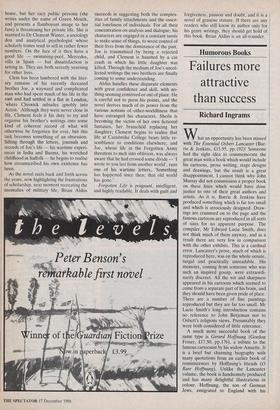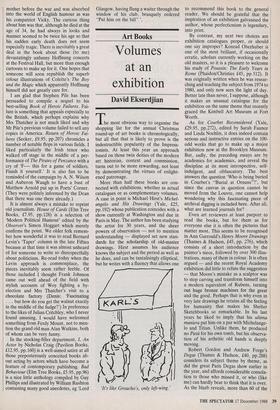Humorous Books
Failures more attractive than success
Richard Ingrams
What an opportunity has been missed with The Essential Osbert Lancaster (Bar- rie & Jenkins, £15.95, pp.192)! Someone had the right idea to commemorate the great man with a book which would include his cartoons, prose writing, stage designs and drawings, but the result is a great disappointment. I .cannot think why John Murray did not commission a proper book on these lines which would have done justice to one of their great authors and artists. As it is, Barrie & Jenkins have produced something which is far too small and which is atrociously designed. Draw- ings are crammed on to the page and the famous cartoons are reproduced in all sorts of sizes for no apparent purpose. The compiler, Mr Edward Lucie Smith, does not think much of them anyway, and as a result there are very few in comparison with the other exhibits. This is a cardinal error. Lancaster's prose, much of which is reproduced here, was on the whole ornate, turgid and practically unreadable. His memoirs, coming from someone who was such an inspired gossip, were extraordi- narily discreet. All the wit and sharpness appeared in his cartoons which seemed to come from a separate part of his brain, and they should have been given pride of place. There are a number of fine paintings reproduced but they are far too small. Mr Lucie Smith's long introduction contains no reference to John Betjeman nor to Osbert's religious views. Presumably they were both considered of little relevance.
A much more successful book of the same type is Gerard Hoffnung (Gordon Fraser, £17.50, pp.176), a tribute to the famous cartoonist by his widow Annette. It is a brief but charming biography with many quotations from an earlier book of reminiscences by Hoffnung's friends (0 Rare Hoffnung). Unlike the Lancaster volume, the book is handsomely produced and has many delightful illustrations in colour. Hoffnung, the son of German Jews, emigrated to England with his mother before the war and was absorbed into the world of English humour as was his compatriot Vicky. The curious thing about him was that, although he died at the age of 34, he had always in looks and manner seemed to be twice his age so that his sudden early death does not seem especially tragic. There is inevitably a great deal in the book about those (to me) devastatingly unfunny Hoffnung concerts at the Festival Hall, but more than enough cartoons to make up for it. One hopes that someone will soon republish the superb colour illustrations of Colette's The Boy and the Magic which apparently Hoffnung himself did not greatly care for.
I am glad that Stephen Pile has been persuaded to compile a sequel to his best-selling Book of Heroic Failures. Fai- lure is something that appeals especially to the British, which perhaps explains why Mrs Thatcher is not much liked and why Mr Pile's previous volume failed to sell any copies in America. Return of Heroic Fai- lures (Secker, £9.95, pp.207) chronicles a number of notable flops in various fields. I liked particularly the Irish tenor who walked off stage in the middle of a per- formance of The Pirates of Penzance with a cry of this for a game of soldiers. Finish it yourself.' It is also fun to be reminded of the campaign by A. N. Wilson and Auberon Waugh to have a bust of Matthew Arnold put up in Poets' Corner. (They were politely informed by the Dean that there was one there already.) It is almost always a mistake to reprint old journalism. House of Cards (Elm Tree Books, £7.95, pp.128) is a selection of 'Modern Political Humour' edited by the Observer's Simon Hoggart which merely confirms the point. We older folk remem- ber how wonderful it was to read Bernard Levin's 'Taper' column in the late Fifties because at that time it was almost unheard of for someone to write so disrespectfully about politicians. Re-read today when the Levin approach is commonplace, the pieces inevitably seem rather feeble. Of those included I thought Frank Johnson came out well ahead of the field with stylish accounts of Woy fighting a by- election and Mrs Thatcher's visit to a chocolate factory (Denis: 'Fascinating . . . but how do you get the walnut exactly in the middle of the fudge?') In preference to the likes of Julian Critchley, who I never found amusing, I would have welcomed something from Ferdy Mount, not to men- tion the grand old man Alan Watkins, both of whom can be very funny.
In the stocking-filler department, I, An Actor by Nicholas Craig (Pavilion Books, £12.95, pp.160) is a well-aimed satire at all those preposterously conceited books ab- out acting by actors which have become a feature of contemporary publishing. Bad Behaviour (Elm Tree Books, £5.95, pp.96) is a nice little anthology compiled by Guy Phillips and illustrated by William Rushton containing many good anecdotes, eg 'Lord Glasgow, having flung a waiter through the window of his club, brusquely ordered "Put him on the bill" '.



























































 Previous page
Previous page